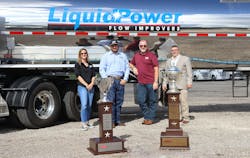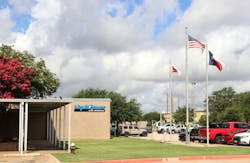Responsibly careful: LSP wins second title—its first in new category
LSP Transport made history four years ago as the first private-fleet operator to win a championship in National Tank Truck Carriers’ long-running North American safety contest, previously dominated by for-hire carriers.
Two years later, NTTC added a third Heil trophy exclusively for private fleets.
“We kind of felt responsible for that,” joked Ross Pendergast, LiquidPower Specialty Products (LSPI) director of operations and LSP Transport general manager, who joined the LSPT team in 2021.
Now LSP Transport is celebrating its 10th anniversary as the private fleet of Berkshire Hathaway-owned LSPI with its second NTTC safety championship, and first in the new private-fleet category, which Gemini Motor Transport controlled the first two years. The bulk hauler secured its initial trophy in the contest’s Sutherland division—now reserved for for-hire carriers with less than 15 million miles—and bagged its second trophy with an accident frequency of 0.180—nearly 50% lower than in 2020. “They’re both satisfying,” said Joe Maple, LSPT safety manager. “It’s hard to win this thing. Darn hard. But the reality is, despite all the growth that’s taken place in the last four years, including personnel changes and facility expansions, we never altered our mindset. It’s still about operating safely and taking care of customers.
“So this win is particularly gratifying for us.”
Maple, Pendergast, and the rest of the LSPT team, which includes Gary Coulter, LSP Transport terminal operations manager, and Jake Politakis, LSPI vice president of supply chain, credit their new AI dashcam and telematics provider, a renewed emphasis on Smith System training, and newly empowered lead operators for their safety achievement at the 2025 NTTC Annual Conference in Tampa, Florida, where Politakis accepted the trophy.
“Everything starts with safety at LSP Transport,” Politakis said.
“When we talk about reliability with customers, we can’t deliver if we’re not a safe organization. Whether it’s out-of-service time on equipment, drivers who are unable to work because they’re injured, or those factors causing people to leave, these things aren’t good. So we want to approach everything with a safety mindset. That’s our foremost commitment.”
Safety success
With support from LSPT’s leaders and ownership group, and the buy-in of its 72 company drivers, that safety-first approach is ingrained in LSPT’s culture—and the results are remarkable. LSPT drivers traveled 5.5 million miles without a preventable accident in 2024; and, more impressively, the company’s last preventable occurred way back on Oct. 2, 2019—a date Maple recalls easily. It was approaching 30 million miles without a preventable this summer.
“That means people aren’t getting hurt,” Maple beamed.
They aren’t getting cited either. LSPT drivers haven’t received a compliance, safety, accountability (CSA) violation in more than a year, a feat Maple credits to the six mechanics charged with maintaining the company’s highly specialized fleet of 82 trucks and 192 tank trailers. Most tractors are Kenworth T680 72-in. sleepers with advanced driver assistance systems and compressors for pumping off LSPI’s viscous product. New stainless-steel Wabash tankers are insulated DOT 407s with automatic tire inflation, disc brakes, and roll stability. “We toot maintenance’s horn all the time in safety meetings because they’re an integral part of what we do,” Maple said. “They ensure we operate safely by showing drivers what to look for in pre- and post-trip inspections, and making sure vehicles are in working order before they leave, instead of saying, ‘Well, it’ll be alright until it gets back.’
“We don’t operate like that. We fix problems before we get on the road.”
See also: LSPT becomes first private fleet to win Heil trophy
New hourly compensation rates encourage drivers—many of whom come from oilfield operations that pay by the mile—to stay safe on pickups and deliveries, no matter how long they take. And with elite equipment, safety-focused managers, and policies that align with careful practices, LSPT drivers are sticking around, perpetuating safe operations. LSPT’s turnover rate is at 5% after reaching 25%-plus three years ago. “It would have been nearly impossible to grow and maintain a high safety standard with that kind of turnover,” Pendergast said.
The industry’s top trade organization is taking notice.
LSPT has won an award every year since it started entering NTTC’s safety contest in 2019, including five Grand awards. It also owns five personnel safety awards—and now two North American safety titles.
“This one feels even better to me,” Coulter said. “It proves the first one wasn’t a fluke.”
Safety improvement
LSPT didn’t repeat by relaxing. The company switched telematics vendor, doubled down on Smith System education, and created a new class of lead operators guided by former driver Chad Moore, now head of services and training, further strengthening its “all-encompassing” safety ecosystem. “Yeah, we paid a lot of attention to safety when we won before, and we did the best we could,” Coulter attested. “But we’ve improved across the board since then.”
The fleet’s previous video safety technology was more punitive than preventive, or “more stick than carrot,” as Coulter says. LSPT’s camera-aided approach rewards drivers for safe behaviors, gamifies improvement, and enables self-coaching through real-time in-cab alerts. “It gives drivers audible alerts inside the truck if they make a mistake, or they’re following too closely or something like that, and gives them a chance to recognize and fix it themselves,” Maple said.
“That has been instrumental in helping drivers change their habits.”
See also: NTTC crowns 2024 safety champions
One veteran driver had a long list of things he hated about cameras when LSPT started piloting its new system three years ago, Coulter relayed. But a few weeks in, he realized he had more bad habits than he cared to admit, and self-correction was making him better. Now LSP equips every tractor with outward-, inward-, and side-facing cameras that provide invaluable liability protection for drivers and the company while improving performance in multiple ways, in one case enabling LSPT to identify and eliminate a rash of dropped trailers.
“We’re getting better at all the things that help us avoid incidents, so the system is tremendously beneficial,” Maple said.
Smith System’s crash-avoidance keys reinforce safe driving habits. LSPT now has six certified instructors who teach the system during introductory and ongoing training. “It’s more ingrained now,” Pendergast said. “We have more people trained in Smith System, who are qualified to train others, we have some in-house capability to teach trainers, and our cameras complement it.” Orientation lasts eight days. Then new drivers head out with a lead operator until they’re ready to drive safely on their own—whether it takes three weeks or three months.
LSPT considers all its drivers operators, because they also must perform safely inside customer facilities, and lead operators are driver trainers with even greater responsibility. Leads meet regularly to ensure training is uniform across all locations, and set an example for other drivers, including setting a precedent for using cones to reduce fixed-object collisions.
“They’re a mentor and coach,” Coulter said. “They’re a sounding board, and they filter information out to our terminal managers.”
Safe expansion
Coulter and Maple contributed to the first NTTC safety championship. Pendergast and Politakis joined them shortly thereafter to spearhead the rapid growth of LSPI’s private-fleet business while keeping a close eye on safety. Over the last three years, LSPT grew its driver pool and fleet; and increased throughput by an even greater amount—with only a slight increase in miles traveled, Pendergast said—by regionalizing operations to enhance efficiency and give drivers more home time.
“When we started this mission four years ago, we quickly realized the value a private fleet gives us—with our customers, and by positioning us with the ability to grow,” Politakis shared. “That’s why we really leaned into figuring out what we needed to do to facilitate this growth,” Politakis said.
That work includes expanding LSPI’s rail car fleet and its facilities.
The bulk transporter is relocating its Bryan, Texas, terminal closer to its LSPI manufacturing facility, currently about 12 miles away, in a 2026 move that will double shop capacity to eight pull-through bays and increase yard space by 40%, Pendergast said. It’s also relocating and expanding its West Texas terminal; adding a maintenance facility in Chickasha, Oklahoma; nearly doubling its yard space in the Lower Midwest; and building out a new site in the Upper Midwest. LSPT also maintains a terminal in the Dakotas, and a drop yard in the Southeast U.S.
“We’re not shy about giving these guys the resources they need,” Politakis said.
“I haven’t said no to any of Ross’ requests in my 3½ years. We’ll see how long the streak continues, but it’s very helpful to have our parent company’s support, and access to capital to make the proper investments in people, tools, and technology it takes to be best-in-class, and I think we’re seeing that with all our safety programs and everything we have in our toolbox.”
Ongoing investments also convey leaders’ belief in LSPT’s continued growth potential, Politakis said—and ensure LSPT will be contending for safety championships for years to come.
Pendergast’s goal is to have a trophy for every terminal, at least.
“If we don’t change anything, and everything continues to go right, we ought to be in the running ever year,” Maple predicted.
About the Author
Jason McDaniel
Jason McDaniel, based in the Houston TX area, has more than 20 years of experience as an award-winning journalist. He spent 15 writing and editing for daily newspapers, including the Houston Chronicle, and began covering the commercial vehicle industry in 2018. He was named editor of Bulk Transporter and Refrigerated Transporter magazines in July 2020.



